- Home
- Philip Roth
Nemesis Page 2
Nemesis Read online
Page 2
Here the Italian guy spat again, this time just to the side of Mr. Cantor's sneakers, and Mr. Cantor called over to the boy who had been waiting to bat next in the game and who, like the rest of us, was silently watching Mr. Cantor face down the ten Italians. "Jerry," Mr. Cantor said, "run to my office. Telephone the police. Say you're calling for me. Tell them I need them."
"What are they going to do, lock me up?" the chief Italian guy asked. "They gonna put me in the slammer for spitting on your precious Weequahic sidewalk? You own the sidewalk too, four eyes?"
Mr. Cantor didn't answer and just remained planted between the kids who'd been playing ball on the asphalt field behind him and the two carloads of Italian guys, still standing on the street at the edge of the playground as though each were about to drop the cigarette he was smoking and suddenly brandish a weapon. But by the time Jerry returned from Mr. Cantor's basement office--where, as instructed, he had telephoned the police--the two cars and their ominous occupants were gone. When the patrol car pulled up only minutes later, Mr. Cantor was able to give the cops the license plate numbers of both cars, which he'd memorized during the standoff. Only after the police had driven away did the kids back of the fence begin to ridicule the Italians.
It turned out that there was sputum spread over the wide area of pavement where the Italian guys had congregated, some twenty square feet of a wet, slimy, disgusting mess that certainly appeared to be an ideal breeding ground for disease. Mr. Cantor had two of the boys go down in the school basement to find a couple of buckets and fill them with hot water and ammonia in the janitor's room and then slosh the water across the pavement until every inch of it was washed clean. The kids sloshing away the slime reminded Mr. Cantor of how he'd had to clean up after killing a rat at the back of his grandfather's grocery store when he was ten years old.
"Nothing to worry about," Mr. Cantor told the boys. "They won't be back. That's just life," he said, quoting a line favored by his grandfather, "there's always something funny going on," and he rejoined the game and play was resumed. The boys observing from the other side of the two-story-high chainlink fence that enclosed the playground were mightily impressed by Mr. Cantor's taking on the Italians as he did. His confident, decisive manner, his weightlifter's strength, his joining in every day to enthusiastically play ball right alongside the rest of us--all this had made him a favorite of the playground regulars from the day he'd arrived as director; but after the incident with the Italians he became an outright hero, an idolized, protective, heroic older brother, particularly to those whose own older brothers were off in the war.
It was later in the week that two of the boys who'd been at the playground when the Italians had come around didn't show up for a few days to play ball. On the first morning, both had awakened with high fevers and stiff necks, and by the second evening--having begun to grow helplessly weak in their arms and legs and to have difficulty breathing--had to be rushed to the hospital by ambulance. One of the boys, Herbie Steinmark, was a chubby, clumsy, amiable eighth grader who, because of his athletic ineptness, was usually assigned to play right field and bat last, and the other, Alan Michaels, also an eighth grader, was among the two or three best athletes on the playground and the boy who'd grown closest to Mr. Cantor. Herbie's and Alan's constituted the first cases of polio in the neighborhood. Within forty-eight hours there were eleven additional cases, and though none were kids who'd been at the playground that day, word spread through the neighborhood that the disease had been carried to the Weequahic section by the Italians. Since so far their neighborhood had reported the most cases of polio in the city and ours had reported none, it was believed that, true to their word, the Italians had driven across town that afternoon intending to infect the Jews with polio and that they had succeeded.
BUCKY CANTOR'S MOTHER had died in childbirth, and he had been raised by his maternal grandparents in a tenement housing twelve families on Barclay Street off lower Avon Avenue, in one of the poorer sections of the city. His father, from whom he'd inherited his bad eyesight, was a bookkeeper for a big downtown department store who had an inordinate fondness for betting on horses. Shortly after his wife's death and his son's birth he was convicted of larceny for stealing from his employer to cover his gambling debts--it turned out he'd been lining his pockets from the day he'd taken the job. He served two years in jail and, after his release, never returned to Newark. Instead of having a father, the boy, whose given name was Eugene, took his instruction in life from the big, bear-like, hard-working grandfather in whose Avon Avenue grocery store he worked after school and on Saturdays. He was five when his father married for a second time and hired a lawyer to get the boy to come to live with him and his new wife down in Perth Amboy where he had a job in the shipyards. The grandfather, rather than going out to hire his own lawyer, drove straight to Perth Amboy, where there was a confrontation in which he was said to have threatened to break his one-time son-in-law's neck should he dare to try in any way to interfere in Eugene's life. After that, Eugene's father was never heard from again.
It was from heaving crates of produce around the store with his grandfather that he began to develop his chest and arms, and from running up and down the three flights to their flat innumerable times a day that he began to develop his legs. And it was from his grandfather's intrepidness that he learned how to pit himself against any obstacle, including having been born the son of a man his grandfather would describe for as long as he lived as "a very shady character." He wanted as a boy to be physically strong, just like his grandfather, and not to have to wear thick glasses. But his eyes were so bad that when he put the glasses away at night to get ready for bed, he could barely make out the shape of the few pieces of furniture in his room. His grandfather, who had never given a second thought to his own disadvantages, instructed the unhappy child--when he'd first donned glasses at the age of eight--that his eyes were now as good as anyone else's. After that, there was nothing further to be said on the subject.
His grandmother was a warm, tenderhearted little woman, a good, sound parental counterweight to his grandfather. She bore hardship bravely, though teared up whenever mention was made of the twenty-year-old daughter who had died in childbirth. She was much loved by the customers in the store, and at home, where her hands were never still, she followed with half an ear Life Can Be Beautiful and the other soap operas she liked where the listener is always shuddering, always nervous, at the prospect of the next misfortune. In the few hours a day when she was not assisting in the grocery, she devoted herself wholeheartedly to Eugene's welfare, nursing him through measles, mumps, and chickenpox, seeing that his clothes were always clean and mended, that his homework was done, that his report cards were signed, that he was taken to the dentist regularly (as few poor children were in those days), that the food she cooked for him was hearty and plentiful, and that his fees were paid at the synagogue where he went after school for Hebrew classes to prepare for his bar mitzvah. But for the trio of common infectious childhood diseases, the boy had unwavering good health, strong even teeth, an overall sense of physical well-being that must have had something to do with the way she had mothered him, trying to do everything that was thought, in those days, to be good for a growing child. Between her and her husband there was rarely squabbling--each knew the job to do and how best to do it, and each carried it off with an avidity whose example was not lost on young Eugene.
The grandfather saw to the boy's masculine development, always on the alert to eradicate any weakness that might have been bequeathed--along with the poor eyesight--by his natural father and to teach the boy that a man's every endeavor was imbued with responsibility. His grandfather's dominance wasn't always easy to abide, but when Eugene met his expectations, the praise was never grudging. There was the time, when he was just ten, that the boy came upon a large gray rat in the dim stockroom back of the store. It was already dark outside when he saw the rat scuttling in and out of a stack of empty grocery cartons that he had helped his gran
dfather to unpack. His impulse was, of course, to run. Instead, knowing his grandfather was out front with a customer, he reached noiselessly into a corner for the deep, heavy coal shovel with which he was learning how to tend the furnace that heated the store.
Holding his breath, he advanced on tiptoe until he had stalked the panicked rat into a corner. When the boy lifted the shovel into the air, the rat rose on its hind legs and gnashed its frightening teeth, deploying itself to spring. But before it could leave the floor, he brought the underside of the shovel swiftly downward and, catching the rodent squarely on the skull, smashed its head open. Blood intermingled with bits of bone and brain drained into the cracks of the stockroom floorboards as--having failed to suppress completely a sudden impulse to vomit--he used the shovel blade to scoop up the dead animal. It was heavy, heavier than he could have imagined, and looked larger and longer resting in the shovel than it had up on its hind legs. Strangely, nothing--not even the lifeless strand of tail and the four motionless feet--looked quite as dead as the pairs of needle-thin, bloodstained whiskers. With his weapon raised over his head, he had not registered the whiskers; he had not registered anything other than the words "Kill it!" as if they were being formulated in his brain by his grandfather. He waited until the customer had left with her grocery bag and then, holding the shovel straight out in front of him--and poker-faced to reveal how unfazed he was--he carried the dead rat through to the front of the store to display to his grandfather before continuing out the door. At the corner, jiggling the carcass free of the shovel, he poked it through the iron grate into the flowing sewer. He returned to the store and, with a scrub brush, brown soap, rags, and a bucket of water, cleaned the floor of his vomit and the traces of the rat and rinsed off the shovel.
It was following this triumph that his grandfather--because of the nickname's connotation of obstinacy and gutsy, spirited, strong-willed fortitude--took to calling the bespectacled ten-year-old Bucky.
The grandfather, Sam Cantor, had come alone to America in the 1880s as an immigrant child from a Jewish village in Polish Galicia. His fearlessness had been learned in the Newark streets, where his nose had been broken more than once in fights with anti-Semitic gangs. The violent aggression against Jews that was commonplace in the city during his slum boyhood did much to form his view of life and his grandson's view in turn. He encouraged the grandson to stand up for himself as a man and to stand up for himself as a Jew, and to understand that one's battles were never over and that, in the relentless skirmish that living is, "when you have to pay the price, you pay it." The broken nose in the middle of his grandfather's face had always testified to the boy that though the world had tried, it could not crush him. The old man was dead of a heart attack by July 1944, when the ten Italians drove up to the playground and single-handedly Mr. Cantor turned them back, but that didn't mean he wasn't there throughout the confrontation.
A boy who'd lost a mother at birth and a father to jail, a boy whose parents figured not at all in his earliest recollections, couldn't have been more fortunate in the surrogates he'd inherited to make him strong in every way--he'd only rarely allow the thought of his missing parents to torment him, even if his biography had been determined by their absence.
MR. CANTOR had been twenty and a college junior when the U.S. Pacific Fleet was bombed and nearly destroyed in the surprise Japanese attack at Pearl Harbor on Sunday, December 7, 1941. On Monday the eighth he went off to the recruiting station outside City Hall to join the fight. But because of his eyes nobody would have him, not the army, the navy, the coast guard, or the marines. He was classified 4-F and sent back to Panzer College to continue preparing to be a phys ed teacher. His grandfather had only recently died, and however irrational the thought, Mr. Cantor felt as though he had let him down and failed to meet the expectations of his undeflectable mentor. What good were his muscular build and his athletic prowess if he couldn't exploit them as a soldier? He hadn't been lifting weights since early adolescence merely to be strong enough to hurl the javelin--he had made himself strong enough to be a marine.
After America entered the war, he was still walking the streets while all the able-bodied men his age were off training to fight the Japs and the Germans, among them his two closest friends from Panzer, who'd lined up outside the recruiting station with him on the morning of December 8. His grandmother, with whom he still lived while commuting to Panzer, heard him weeping in his bedroom the night his buddies Dave and Jake went off to Fort Dix to begin basic training without him, heard him weeping as she'd never known Eugene to weep before. He was ashamed to be seen in civilian clothes, ashamed when he watched the newsreels of the war at the movies, ashamed when he took the bus home to Newark from East Orange at the end of the school day and sat beside someone reading in the evening paper the day's biggest story: "Bataan Falls," "Corregidor Falls," "Wake Island Falls." He felt the shame of someone who might by himself have made a difference as the U.S. forces in the Pacific suffered one colossal defeat after another.
Because of the war and the draft, jobs in the school system for male gym teachers were so numerous that even before he graduated from Panzer in June of 1943, he had nailed down a position at ten-year-old Chancellor Avenue School and signed on as the summertime playground director. His goal was to teach phys ed and coach at Weequahic, the high school that had opened next door to Chancellor. It was because both schools had overwhelmingly Jewish student bodies and excellent scholastic credentials that Mr. Cantor was drawn to them. He wanted to teach these kids to excel in sports as well as in their studies and to value sportsmanship and what could be learned through competition on a playing field. He wanted to teach them what his grandfather had taught him: toughness and determination, to be physically brave and physically fit and never to allow themselves to be pushed around or, just because they knew how to use their brains, to be defamed as Jewish weaklings and sissies.
THE NEWS THAT SWEPT the playground after Herbie Steinmark and Alan Michaels were transported by ambulance to the isolation ward at Beth Israel Hospital was that they were both completely paralyzed and, no longer able to breathe on their own, were being kept alive in iron lungs. Though not everybody had shown up at the playground that morning, there were still enough kids for four teams to be organized for their daylong round robin of five-inning games. Mr. Cantor estimated that altogether, in addition to Herbie and Alan, some fifteen or twenty of the ninety or so playground regulars were missing--kept home, he assumed, by their parents because of the polio scare. Knowing as he did the protectiveness of the Jewish parents in the neighborhood and the maternal concern of the watchful mothers, he was in fact surprised that a good many more hadn't wound up staying away. Probably he had done some good by speaking to them as he had the day before.
"Boys," he had said, gathering them together on the field before they disbanded for dinner, "I don't want you to begin to panic. Polio is a disease that we have to live with every summer. It's a serious disease that's been around all my life. The best way to deal with the threat of polio is to stay healthy and strong. Try to wash yourself thoroughly every day and to eat right and to get eight hours of sleep and to drink eight glasses of water a day and not to give in to your worries and fears. We all want Herbie and Alan to get better as soon as possible. We all wish this hadn't happened to them. They're two terrific boys, and many of you are their close friends. Nevertheless, while they are recovering in the hospital, the rest of us have to go on living our lives. That means coming here to the playground every day and participating in sports as you always do. If any of you feel ill, of course you must tell your parents and stay at home and look after yourself until you've seen a doctor and are well. But if you're feeling fine, there's no reason in the world why you can't be as active as you like all summer long."
From the kitchen phone that evening he tried several times to call the Steinmark and Michaels families to express his concern and the concern of the boys at the playground and to find out more about the condition of the t
wo sick boys. But there was no answer at either house. Not a good sign. The families must still have been at the hospital at nine-fifteen at night.
Then the phone rang. It was Marcia, calling from the Poconos. She had heard about the two kids at his playground. "I spoke to my folks. They told me. Are you all right?"
"I'm fine," he said, extending the cord of the phone so he could stand where it was a touch cooler, closer to the screen of the open window. "All the other boys are fine. I've been trying to reach the families of the boys in the hospital to find out how they're doing."
"I miss you," Marcia said, "and I worry about you."
"I miss you too," he said, "but there's nothing to worry about."
"Now I'm sorry I came up here." She was working for the second summer as a head counselor at Indian Hill, a camp for Jewish boys and girls in Pennsylvania's Pocono Mountains seventy miles from the city; during the year she was a first-grade teacher at Chancellor--they'd met as new faculty members the previous fall. "It sounds awful," she said.
"It's awful for the two boys and their families," he said, "but the situation is far from out of hand. You shouldn't think it is."
"My mother said something about the Italians coming up to the playground to spread it."
"The Italians didn't spread anything. I was there. I know what happened. They were a bunch of wise-guys, that's all. They spit all over the street, and we washed it away. Polio is polio--nobody knows how it spreads. Summer comes and there it is, and there's nothing much you can do."
"I love you, Bucky. I think of you constantly."
Discreetly, so none of the neighbors could hear him through the open window, he lowered his voice and replied, "I love you too." It was difficult to tell her that because he had disciplined himself--sensibly, he thought--not to pine for her too much while she was away. It was also difficult because he'd never declared himself that openly to another girl and still found the words awkward to say.

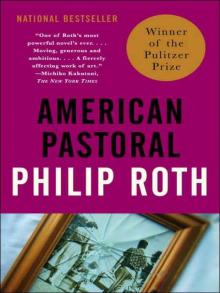 American Pastoral
American Pastoral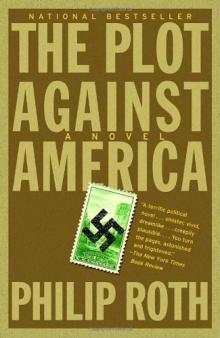 The plot against America
The plot against America The Human Stain
The Human Stain Nemesis n-4
Nemesis n-4 Sabbath’s Theater
Sabbath’s Theater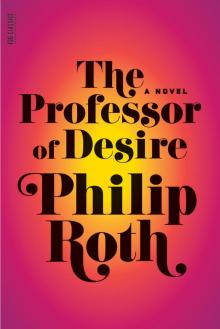 The Professor of Desire
The Professor of Desire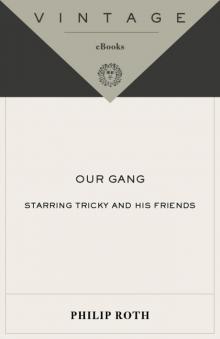 Our Gang
Our Gang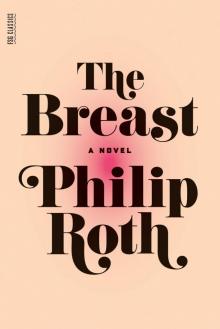 The Breast
The Breast Operation Shylock
Operation Shylock The Dying Animal
The Dying Animal Letting Go
Letting Go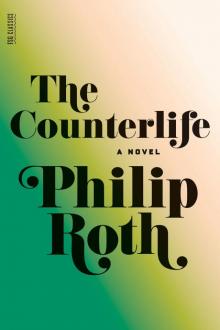 The Counterlife
The Counterlife Everyman
Everyman Nemesis
Nemesis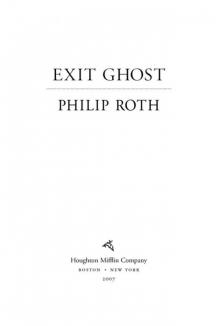 Exit Ghost
Exit Ghost Portnoy's Complaint
Portnoy's Complaint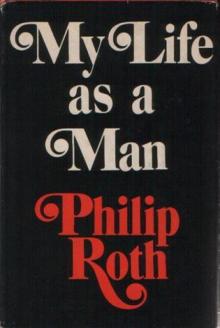 My Life as a Man
My Life as a Man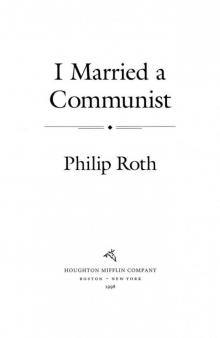 I Married a Communist
I Married a Communist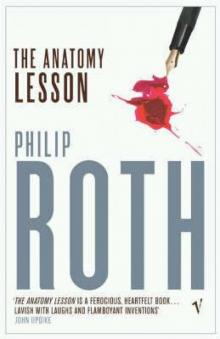 The Anatomy Lesson
The Anatomy Lesson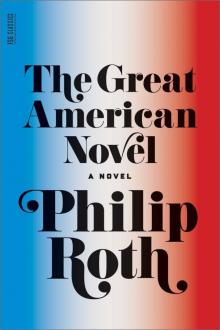 The Great American Novel
The Great American Novel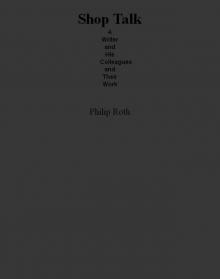 Shop Talk
Shop Talk The Humbling
The Humbling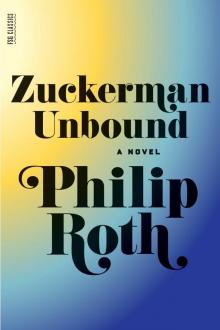 Zuckerman Unbound
Zuckerman Unbound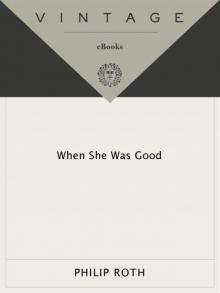 When She Was Good
When She Was Good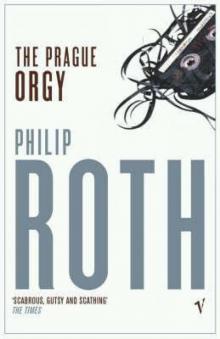 The Prague Orgy
The Prague Orgy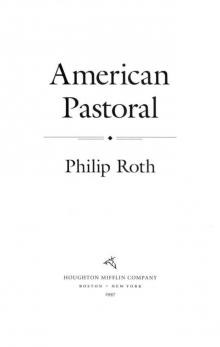 American Pastoral (Nathan Zuckerman)
American Pastoral (Nathan Zuckerman) Goodbye, Columbus
Goodbye, Columbus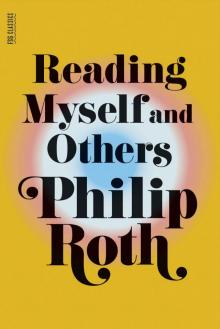 Reading Myself and Others
Reading Myself and Others